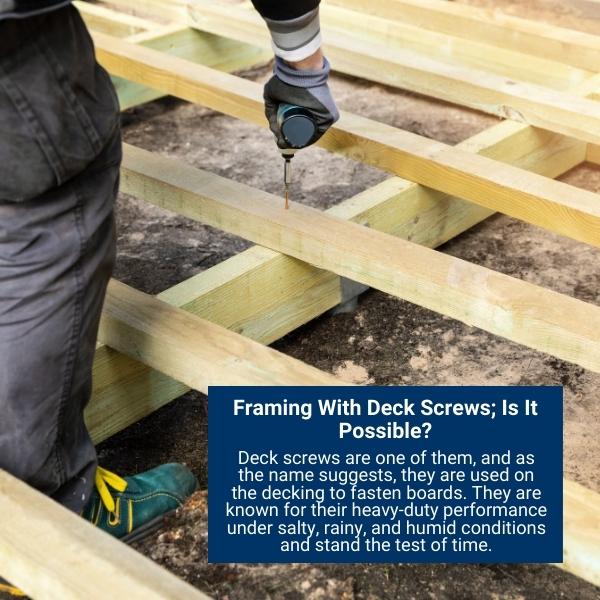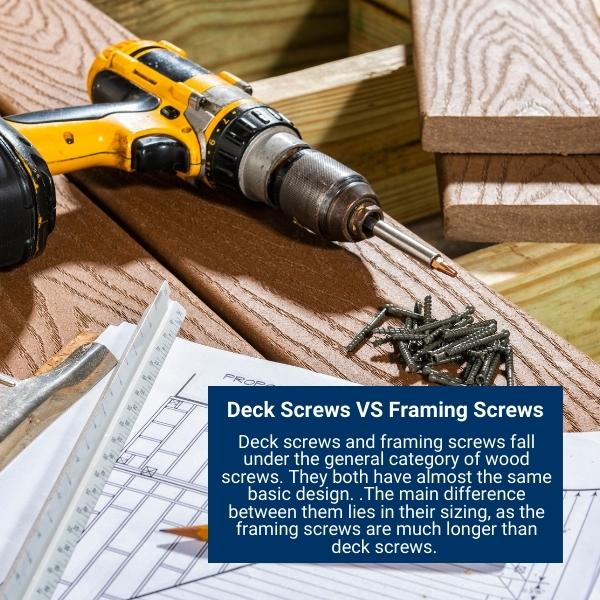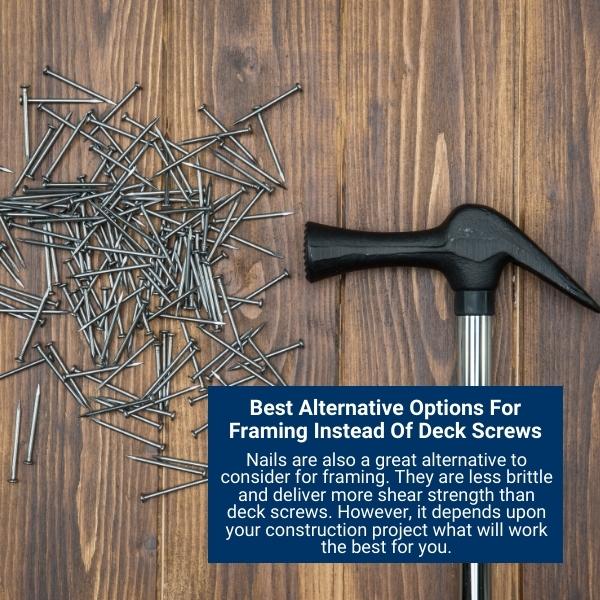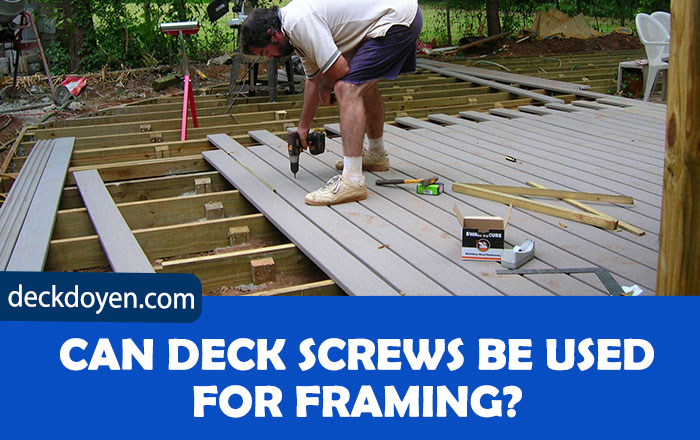Deck screws, often coming in stainless steel, are a top pick for usage in aggressive environments. Also, keeping in sight their anti-corrosive quality, you might think they can work as a suitable candidate for framing projects.
If you are planning to buy them but are unsure if they will be a good choice for construction situations, you might want to inquire, can deck screws be used for framing?
Deck screws cannot be used for framing as they do not have enough shear strength. They tend to snap if too much pressure is exerted on them, making them an unsuitable choice for framing. They fail to provide the support that is required. Thus, it is handier to go for construction screws designed for framing purposes. The framing screws are bigger than deck screws and have a special coating that gives them extra strength.
Screws make the whole process of holding things together much easy. But, different screws types have their specific uses, and the same is correct for deck screws. Let’s find out more about them!
Also Read: Are Decking Screws Rust Proof
Framing With Deck Screws; Is It Possible?
You can get your hands on various screws types ranging in shapes, sizes, and durability. Deck screws are one of them, and as the name suggests, they are used on the decking to fasten boards. They are known for their heavy-duty performance under salty, rainy, and humid conditions and stand the test of time. Their ability to withstand harsh conditions and handle larger weights makes them ideal for outdoor use.

Considering their properties, one may think if deck screws can perform equally effectively for framing. The answer is no. They are not engineered and designed for framing use. Deck screws are never a recommendation for structural situations, and manufacturers do not give them approval. The only type of screws that are acceptable for framing are specialized constructions screws.
One evident reason is that deck screws are not strong or flexible enough to handle the pressure. Moreover, although they are resistant to pull-outs, they are weak in shear. As a result, they are unable to provide sufficient support for framing. For instance, they can snap if an earthquake strikes or other similar natural phenomena.
The deck screws do not have adequate shear strength and possess a breaking risk if the foundation shifts due to any external cause. They are also far more prone to breakage than nails and are expensive in comparison. It is why farmers never use them. Thus, it is better to opt for framing screws that serve the same purpose much more effectively.
Also Read: Should You Install Deck Posts in Concrete or On Top?
Besides, some states do not permit constructors to use deck screws for structural situations. These include attaching stairs, building walls, and framing as well. If you opt for improper building techniques, the inspectors will issue an order, and you might have to rebuild and start the process from scratch.
Deck Screws VS Framing Screws; Main Differences
Deck screws and framing screws fall under the general category of wood screws. They both have almost the same basic design. The main difference between them lies in their sizing, as the framing screws are much longer than deck screws. The larger size of the construction screws makes them well-suited for multi-purposes, including framing.

Apart from size, the composition material of deck screws and framing screws is also different. Manufacturers commonly use stainless steel for creating deck screws. On the other hand, framing screws can be stainless or bronze material. Also, they contain an extra coating of some kind, like zinc. This coating offers more strength to these screws and increases their effectiveness. So, framing screws are a better choice for framing than deck screws.
Can You Use Deck Screws And Nails Together For Framing?
Screws and nails often are utilized for holding together various things ranging from a wooden house frame to kitchen cabinetry and outdoor decking. Thus, in a way, it is a possibility to use deck screws accompanied by nails for framing.
Also Read: Deck Blocks vs. Post Holes: Which One To Use And Where?

Nails are flexible under pressure and offer immense strength for framing projects. In addition, their application process is much faster, and they are also cheaper than screws. It is a leading reason why woodworkers prefer nails for framing. A similar length of nails is more durable than the screws and capable of tolerating sheer pressure. Nevertheless, if you want added strength and durability, you can use deck screws alongside nails.
Also Read: Best Wood For Decking
Best Alternative Options For Framing Instead Of Deck Screws:
Deck screws possess weather-resistant properties, designed for fixing decking boards to joists. However, many people opt for wood or deck screws to build structural elements. It is not advisable to do so, and many disadvantages are attached to this practice.

As I am talking about screws, there are two popular options available that you can instead use for framing. They include structural screws and construction screws. For this purpose, an ideal screw would be a number nine, 2.5-inch construction screw. Besides, when choosing the length of the screw, ensure that the fastener should be at least 1.75-2 times the length of the pieces that you are trying to connect.
Also Read: Kreg Deck Jig V/s Camo? Which One To Use and Where?
Similarly, nails are also a great alternative to consider for framing. They are less brittle and deliver more shear strength than deck screws. However, it depends upon your construction project what will work the best for you. Short and thin nails, for instance, do not hold the structure well, while long ones are often difficult to install. So, it is necessary to choose the right nail and thickness to get the perfect size for framing.
Final Thoughts:
Using deck screws for framing is a big no-no as they are brittle and do not provide the strength required for construction projects. Many people find nails a handier option as they have tremendous power in shear but are subject to pull-out. Deck screws are resistant to pull-out but are weak in shear. So, no one would want to frame a house with them when other options can yield the desired results within budget.
Also Read: Deck Armor Vs Tiger Paw: Which One To Use and Where?

